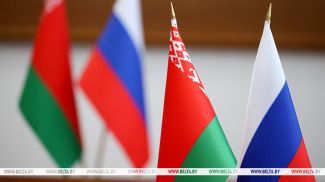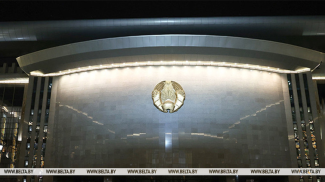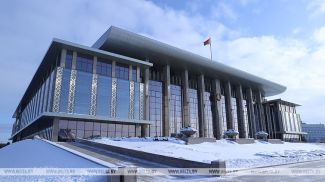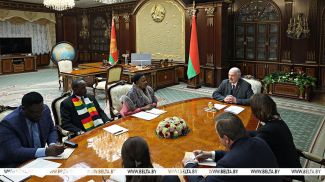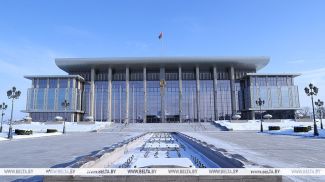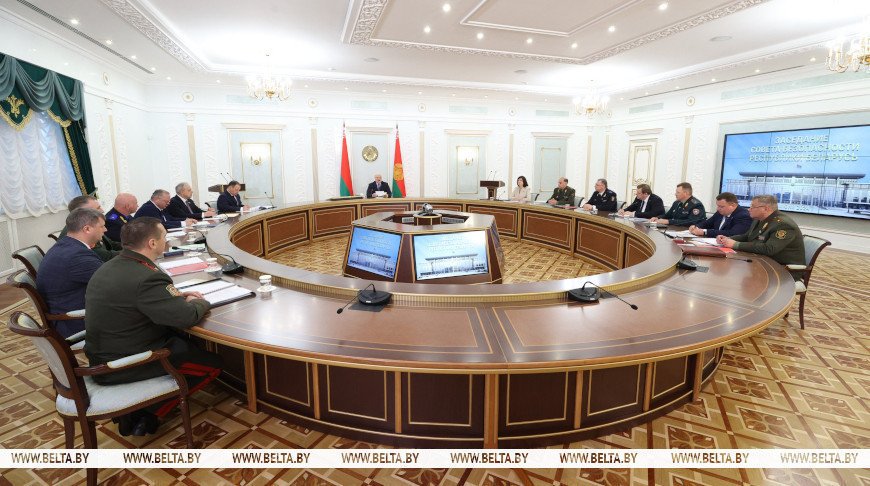
MINSK, 18 June (BelTA) – Belarusian President Aleksandr Lukashenko has convened a meeting of the Security Council as a follow-up to the new National Security Concept adopted at the recent Belarusian People's Congress. Today the Security Council is set to consider a draft regulatory act related to the assessment of national security, BelTA has learned.
“We need to develop a criterion for assessing the state of national security. Given the importance of this document, it was decided to hold a meeting of the Security Council and consider it in this format. As you remember, the need to revise the relevant normative legal acts to develop the new National Security Concept was mentioned at the 7th Belarusian People's Congress,” the president said. “We talked that the National Security Concept is a public document. We studied it thoroughly, reviewed it at dialogue platforms, and then approved it at the Belarusian People’s Congress. This concept (which in fact contains general directions, theory) needs normative acts to concretize and regulate it.”
In fact, these documents are an integral part of the concept, but according to the established practice they are of a closed nature.
“The concept has been approved. Our national strategic interests, threats, priority areas of their neutralization, the general vision of security have been defined. Everything is very clear here. The Republic of Belarus is a peaceful country, always open for equitable dialogue and mutually beneficial cooperation. We have never threatened anyone. We openly (unlike other countries) communicate our approaches to everyone. Whoever wants to hear it will hear it,” Aleksandr Lukashenko emphasized.
As for the relevance of the main topic of the current meeting of the Security Council, the president said: “We have been saying that it is not enough just to enshrine certain provisions in normative legal acts. It is time to put these approaches into practice. We must have a clear picture of what is really going on inside the country and around it. Military security, economy, social welfare, policies and other sectors. We need a maximally verified and objective understanding.”
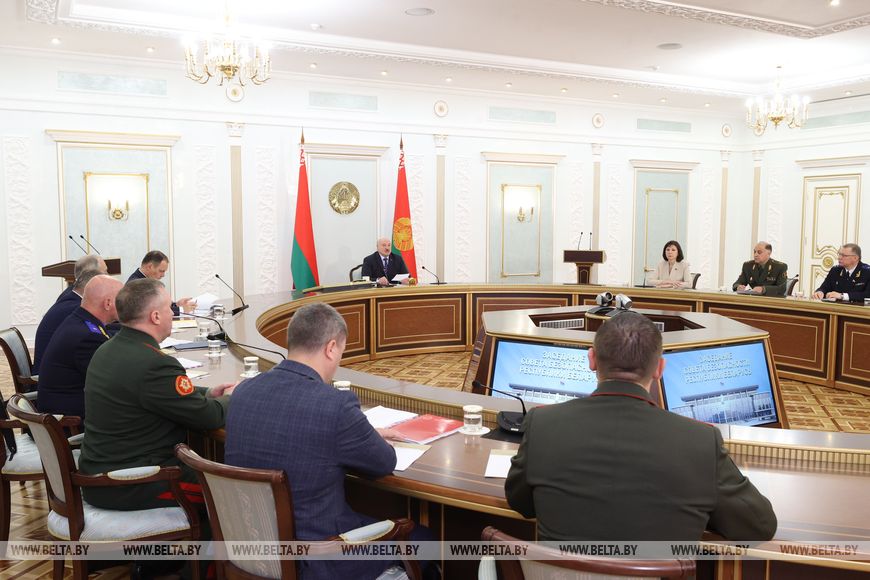
In this regard, Aleksandr Lukashenko put forward a number of questions regarding the work done to improve the current system of assessing the state of national security; the proposed changes and their coordination with the new National Security Concept. He stressed the importance of making sure that the proposed assessment system reflects the real state of affairs in each area of national security.
“You know our requirements - there should be no formalism and oversimplification here,” the head of state stressed.
Among the speakers at the meeting were State Secretary of the Security Council Aleksandr Volfovich, Economy Minister Yuri Chebotar and Defense Minister Viktor Khrenin.
The State Secretariat has developed a draft presidential decree on the approval of documents for the implementation of the National Security Concept of the Republic of Belarus. After the approval of the concept at the Belarusian People’s Congress, this is the next important stage of improving the legislation in this area. “The purpose of the document, taking into account new changes, is to clarify the procedure for assessing the state of national security based on the system of indicators developed for each of the nine sectors of national security,” Aleksandr Volfovich said. “Work on the draft decree was similar to the one during the preparation of the National Security Concept. We have kept the best practices in the document, everything which proved efficient, and some new things. We have also taken into account new proposals keeping in mind the current situation.”
Despite a number of additions, the structure of the document and the general algorithm of work remained largely unchanged. As before, every sector has its responsible coordinating body and implementing bodies, which, in accordance with the established procedure, analyze and propose an appropriate assessment. As before, the state of national security in each area is assessed according to three criteria: stable, unstable and requiring urgent measures. This corresponds to the concepts of risk, challenge and threat to national security enshrined in the document.
“We need to develop a criterion for assessing the state of national security. Given the importance of this document, it was decided to hold a meeting of the Security Council and consider it in this format. As you remember, the need to revise the relevant normative legal acts to develop the new National Security Concept was mentioned at the 7th Belarusian People's Congress,” the president said. “We talked that the National Security Concept is a public document. We studied it thoroughly, reviewed it at dialogue platforms, and then approved it at the Belarusian People’s Congress. This concept (which in fact contains general directions, theory) needs normative acts to concretize and regulate it.”
In fact, these documents are an integral part of the concept, but according to the established practice they are of a closed nature.
“The concept has been approved. Our national strategic interests, threats, priority areas of their neutralization, the general vision of security have been defined. Everything is very clear here. The Republic of Belarus is a peaceful country, always open for equitable dialogue and mutually beneficial cooperation. We have never threatened anyone. We openly (unlike other countries) communicate our approaches to everyone. Whoever wants to hear it will hear it,” Aleksandr Lukashenko emphasized.
As for the relevance of the main topic of the current meeting of the Security Council, the president said: “We have been saying that it is not enough just to enshrine certain provisions in normative legal acts. It is time to put these approaches into practice. We must have a clear picture of what is really going on inside the country and around it. Military security, economy, social welfare, policies and other sectors. We need a maximally verified and objective understanding.”
In this regard, Aleksandr Lukashenko put forward a number of questions regarding the work done to improve the current system of assessing the state of national security; the proposed changes and their coordination with the new National Security Concept. He stressed the importance of making sure that the proposed assessment system reflects the real state of affairs in each area of national security.
“You know our requirements - there should be no formalism and oversimplification here,” the head of state stressed.
Among the speakers at the meeting were State Secretary of the Security Council Aleksandr Volfovich, Economy Minister Yuri Chebotar and Defense Minister Viktor Khrenin.
The State Secretariat has developed a draft presidential decree on the approval of documents for the implementation of the National Security Concept of the Republic of Belarus. After the approval of the concept at the Belarusian People’s Congress, this is the next important stage of improving the legislation in this area. “The purpose of the document, taking into account new changes, is to clarify the procedure for assessing the state of national security based on the system of indicators developed for each of the nine sectors of national security,” Aleksandr Volfovich said. “Work on the draft decree was similar to the one during the preparation of the National Security Concept. We have kept the best practices in the document, everything which proved efficient, and some new things. We have also taken into account new proposals keeping in mind the current situation.”
Despite a number of additions, the structure of the document and the general algorithm of work remained largely unchanged. As before, every sector has its responsible coordinating body and implementing bodies, which, in accordance with the established procedure, analyze and propose an appropriate assessment. As before, the state of national security in each area is assessed according to three criteria: stable, unstable and requiring urgent measures. This corresponds to the concepts of risk, challenge and threat to national security enshrined in the document.




